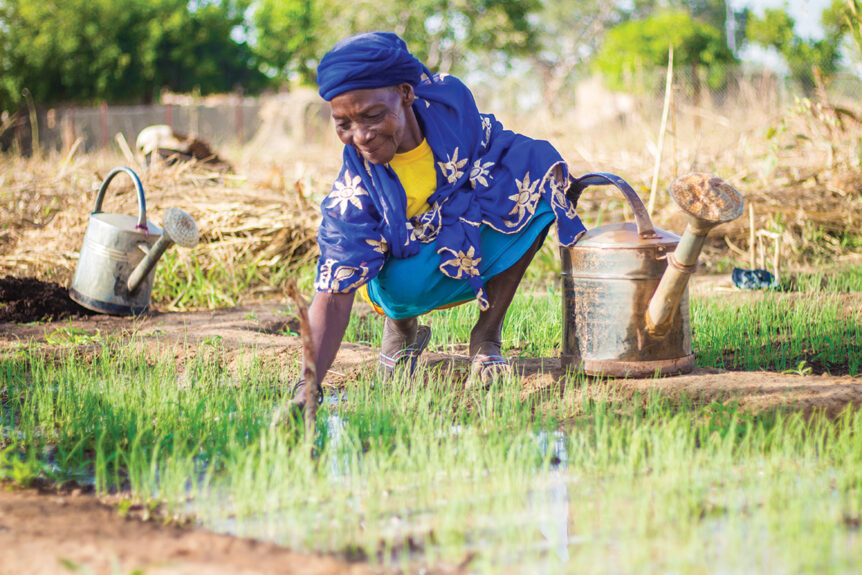SustInAfrica has started on September 20 and is expected to be concluded in August 25.
The overall goal of is to empower West and North African smallholder farmers and small- to medium-sized enterprises , in 39 core communities from 13 Agro-Ecological Zones (AEZs) in Burkina Faso, Ghana, Niger – West Africa – and Egypt and Tunisia – North Africa -.
The targeted crops vary between with staple crops such as Maize, Sorghum and Millet produced for local and regional markets, and high value crops such as Cotton, Olives, Mango and Pineapple also for export.
After 24 months of program implementation, since September 2020 until September 2022 the project achieved the following :
WP1: Baseline analysis & monitoring system’s design of West & North African farming systems
- To conduct the agrophysical and socioeconomic baseline data collection a toolbox was built to be implemented by the local teams on the 39 communities of the 5 countries, with the experimental digital data collection tools in English, French and Arabic through the Mergdata platform from Farmerline Ltd..
- The digital data is now populating a database created also using Mergdata, which already include some preliminary data or series of baseline socioeconomic and agronomic data.
Next Steps
- The assessment and mapping of the ecosystem services provided by the selected farming systems will follow, considering the Common International Classification of Ecosystem Services (CICES).
- Building an open access database on quantitative elements and report on ecosystems services.
- Building an open access database on quantitative key elements of farming systems per region and country
WP2: Smart farming technologies for plant production
- To build an artificial intelligence-based classification algorithm to find pest insects in the field (app InsectaMon), insect pheromone traps and yellow sticky traps were acquired and put in selected field trials.
- First UAV (Unmanned Aerial Vehicles AKA drones) test flights with camera sensors took place for developing a field remote sensing model.
Next Steps
- The acquisition of the UAV data and the insect’ image data for a remote sensing model and machine learning of the app InsectaMon.
WP3: Targeted design & implementation of demonstration trials for resilient & sustainable agricultural production & delivery of ecosystem services
- For each country, selected crop and Agroecological Zone (AEZ) the hypotheses, aims, and experimental designs of the agro-ecological practices and technologies that will be trialled where set.
- Each trial adopts the on-farm participatory approach experimental design and field trials have started being implemented and controlled by researchers in cooperation with local extension services and farmers.
Next Steps
- The full implementation of all field trials on demonstration camps and farmers’ plots in the 5 countries and correspondent data collection to confirm (or not) the trials’ hypothesis.
WP4: Education & training approaches to sustainable agriculture in Africa
- SustInAfrica has launched an interactive learning platform, based on the Mergdata platform run Farmerline. The platform aims to provide multimedia, integrate social media and forums to facilitate peer-to-peer learning.
Next Steps
- The design of an interactive learning platform, based on the Mergdata platform run by Farmerline. The platform aims to supply multimedia, integrate social media and forums to ease peer-to-peer learning.
- The adaptation of the educational approach developed by the EU funded H2020 NextFOOD project – Educating The Next Generation Of Professionals In The Agrifood And Forestry System (www.nextfood-project.eu) -, to the SustInAfrica needs, based on action learning, multi-actor, competence based and systems thinking education approach.
WP5: Sustainability, replicability, and exploitation of successful practices
- To assess the potential impact of approaches developed as part of the SustInAfrica, the project conducted sectoral research criteria and tools used to screen gender, nutrition, environment, and their resilience to current and future climatic shocks and stresses.
- Description of a methodology and a set of baseline and innovation indicators to assess the replicability/ adaptability of SustInAfrica innovations in heterogeneous territorial and socio-economic contexts of the project.
- To assess the potential impact of approaches developed as part of the SIAfrica, the project conducted sectoral research criteria and tools used to screen gender, nutrition, environment, and their resilience to current and future climatic shocks and stresses.
Next Steps
- The scoring of the technologies as to climate resilience and impact on nutrition, gender and the environment
- The description of the agri-food system, context, and actors involved in the value chain of the higher scored technologies to assure proper adoption.
WP6: Communication and dissemination
- Communication plan defined
- Stakeholders associated to each crop were mapped in a agro-food sector data base per country, which will support various phases of the analysis further in the project.
Next Steps
- Organization of WP1 Baseline data collection conclusion and data validated by household, community, region and country selected stakeholders and workshop for data validation and synthesis for supporting the socio-economic, agrophysical and institutional characterization of the farming systems of each core community.
SustInAfrica is funded by EU Horizon 2020 Research and Innovation Programme under Grant Agreement 861924.

